Saturday, March 25, 2006
No 1 English teacher
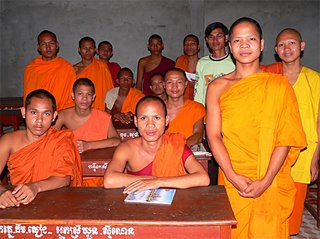
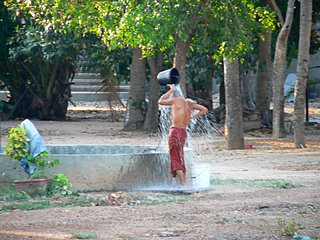 I wrote a few weeks back about the monks' class being a little subdued compared with my other English class. There have been developments in the time since I wrote that.
I wrote a few weeks back about the monks' class being a little subdued compared with my other English class. There have been developments in the time since I wrote that.I was allowing myself to loosen up a little, going into crazy storytelling mode from time to time and invited the monks to do likewise. 'Not appropriate for monks' was the answer I was given.
However, as we get to know each other they have become much looser and we have many jokes together. We are not following a published course but I do use lessons that I am able to download from the internet. http://www.english-to-go.com/ The monks tend to set the course of discussion that goes much wider than the materials presented. I guess the questions stem from their reading. 'Please explain the meaning of "rally" and "gather" ' for example. The favourite topic so far seems to be sexual practices in Western countries. I think they were quite shocked when I suggested there was no value for a man in marrying a virgin.
I asked them if our topics were appropriate for monks. The reply came, 'We can discuss anything.' He didn't need to add, 'We just can't do anything.'
Recently we were doing an exercise in relation to a newspaper article that required them to put a list of events in order. After they had been working on this for some time I asked, 'What is number one?'
The reply came in a rather dry tone, 'A condom.'
Some of the others laughed a little but I had difficulty controlling my laughter. He was right, of course, Number 1 is a popular brand of condom in Cambodia. I had seen the posters advertising them.
* * *
The monks have invited me to stay at Wat Xam either permanently or overnight. But perhaps I am still addicted to my relative luxury. While compared to most of my family and friends back in Australia I live very simply and frugally, to the monks I am rich.
'Do you have a fan?' I asked last time they invited me.
'No.' Temperatures here have recently been reaching about 37 C. I doubt that their rooms are as well ventilated as mine. They are probably smaller than mine. And yet they sleep without the benefit of a fan.
They bathe communally and in public, drawing water from a well, while I have my own personal bathroom with running water and a shower. Sure I have no hot water but with the present temperature range it is entirely superfluous.
Yes indeed, I am rich.
* * *
Many monks manage to improve their vocabulary by reading in English. This does not necessarily help their pronunciation. They often say to me, 'Can you explain the word "xyzxyz"?' That might as well be what they say. It is often impossible for me to guess what it is they are saying.
'Can you spell it?' I ask and write it on the board. Sometimes the spelling is wrong too but we are getting closer.
When I did this process a few days ago the word I got on the board was 'psychiatrist'.
I demonstrated the correct pronunciation and was then asked, 'What is a psychiatrist?'
Another quickly answered 'a doctor for crazy people'.
Often their explanations are simplistic and I try to discourage their use of derogatory words. (They didn't know what the word 'derogatory' meant two weeks ago.)
'Not everyone who visits a psychiatrist is crazy,' I say.
'Is a psychiatrist someone who treats people with downs syndrome?' They have some knowledge of downs syndrome because there are a few such people in town. However, my experience is that locals write these people off by saying, 'He crazy.'
'Not necessarily,' I answer. 'Downs syndrome is not just related to the brain. And most psychiatrists treat normal people who happen to have a mental illness.' I find it difficult to explain simply.
They do not seem to understand that otherwise 'normal' people might have a mental illness. I decide to start with something they know.
'The Buddha told us that we all experience dukkha (suffering and the general unsatisfactoriness of existence). It is not just poor people who experience dukkha. Rich people also have dukkha. Even the richest person in the world has dukkha.'
Some of them look at me strangely. I find many people here, including one or two of the monks, believe that if they were rich all their problems would be gone. This suggests they do not understand the point of what the Buddha was saying.
'So we take a person in Australia or some other Western country. They have a good husband or wife. They have a nice home. They have a job. They have everything in life that a Cambodian might think a person could want to make them happy. And yet they still experience dukkha.
'Many people find this hard to understand and they become very sad. When this sadness persists doctors call it "depression". Depression is one of the mental illnesses that are often treated by psychiatrists.
'People learn to cope with depression in different ways. Some go to the doctor and get a drug that makes them feel happy. Some drink alcohol and get drunk every night. But the drug and the alcohol do not take the depression away. If the person stops taking them the depression returns.'
We are moving towards some understanding. It is hard to explain something that is so far outside their world. Sadly, as their world becomes more like ours, I expect they too will discover depression and the many ways of attempting to cope with it.
* * *
Often I sit in my room and think about the poverty of the people here. Invariably tears come to my eyes. I am only one person. There is so little I can do.
I once met a woman who had worked as an Engish teacher in developing countries. She told me that she could not cope with Cambodia. The poverty was too great. She simply could not stand to see it on a daily basis. She had to leave.
I try to keep this blog fairly light. I write about the more pleasant aspects of my life here. You might get the idea that this is paradise. But I have my challenges. There is dukkha for me too. When the going gets tough I think about the poverty of the people I talk to every day. I think about their friendliness, cheerfulness, generosity and their ability to keep going despite their hardships. Tears roll down my cheeks. And then I get on with what I came here to do.
Saturday, March 18, 2006
How many calories do you need?
The poverty rate in Cambodia is assessed by the World Bank at 1,826 reil (roughly 60 cents Australian) per day. 80% of this is based on the cost of 2,100 calories of food. I am not one who has ever needed to count calories. However I know that many of my friends and family in Australia diet regularly and this figure would have more meaning to them. Just what would 2,100 calories of food relate to in your diet? Would you feel full if that was all you got each day? Could someone tell me as the figure means nothing to me.
Assuming this figure has meaning to you then consider the fact that 35% of the population of Cambodia, that's close to 5 million people, in 2004, had less than this.
Figures taken from an article by Sam Rith in the Phnom Penh Post issue dated Feb 24—March 9, 2006
Assuming this figure has meaning to you then consider the fact that 35% of the population of Cambodia, that's close to 5 million people, in 2004, had less than this.
Figures taken from an article by Sam Rith in the Phnom Penh Post issue dated Feb 24—March 9, 2006
Wednesday, March 15, 2006
Village festival
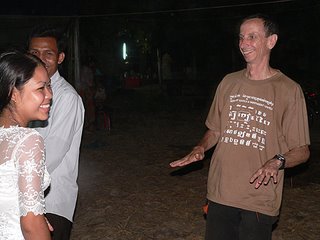
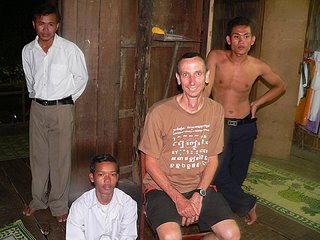 On Saturday night La picked me up on his bicycle to take me to a village on the other side of town where they were holding their village festival. Apparently we arrived a little late as the festivities were well under way. I was sat down at a table, otherwise filled with young women in traditional costume, and given some food. I expressed disappointment when told that I had missed the dancing. But they assured me they would get it going again.
On Saturday night La picked me up on his bicycle to take me to a village on the other side of town where they were holding their village festival. Apparently we arrived a little late as the festivities were well under way. I was sat down at a table, otherwise filled with young women in traditional costume, and given some food. I expressed disappointment when told that I had missed the dancing. But they assured me they would get it going again. All these girls were quite intrigued to have me sitting with them but none of them tried to engage me in conversation or responded when I spoke to them in English. My Khmer is not up to the chatting-up-ladies level yet. When the dancing eventually started again La took my camera and after a quick lesson he became the photographer for the night.
I'm not sure if the young woman who had the honour of dancing with me was pleased or not. They obviously spend a lot of time learning the movements for their traditional dances and here was this barung making a mess of it all.
We sat down after a while and I tried taking a few photos. I wanted to get the girls in their costumes but they were remarkably shy, compared to Thais I have photographed in similar situations. La explained that few of them speak English and most of them work in the garment factory that is on my side of town. This factory must be huge. When I return from Phnom Penh on the bus it apparently coincides with the end of a shift. There are literally thousands of young women coming out of the factory and heading into town—on bicycles, motorcycles and in the backs of trucks. The place must employ a huge percentage of the young female population of Kompong Chhnang.
Back to the festival—the dancing was started up once again and another partner was found for me. This one responded more enthusiastically and at least smiled most of the time (see photo).
After this segment ended I was given some dessert. I noticed that the girls were going home and returning in modern Western outfits. It seems that as soon as the obligatory dancing was over they couldn't wait to get out of their traditional costumes.
There were a few there who were English students at Wat Xam, one of whom invited me to see her house. The house was highset and the steps were steep with no railings. From the verandah I could see that the front of the house was bare timber but the side walls were of palm leaves. Inside the front room were bare floorboards. The gaps between the boards were wide enough in places for a foot to go through. There were also many gaps in the palm-leaf cladding.
The room was almost bare. Some clothes were hung on a railing placed diagonally across one corner. In another corner were two huge speakers from a PA system. In another corner was a TV set and karaoke system which all looked quite flash to me. A couple of mats were brought in and placed on the floor and then, as an afterthought, it seemed, a chair. I was beckoned to sit on the chair which was pointed towards the TV which was duly turned on.
It became obvious that I had been brought in to admire the TV set. But I could not help but notice the impoverished setting it was placed in. I know it is not for me to judge how other people choose to live but I must admit to a feeling of disappointment. It seems that the best we in the West can offer to improve the lives of these people is modern dress and TV sets.
I am reminded of a Calvin & Hobbes cartoon that appeared in the paper not long before I last left Oz. Calvin was lying on the floor reading a book and says to Hobbes, 'It says here that religion is the opiate of the masses. I wonder what that means.'
The next panel of the cartoon showed a TV set saying, 'It means Karl Marx ain't seen nothing yet.'
Saturday, March 11, 2006
How many Cambodians...?
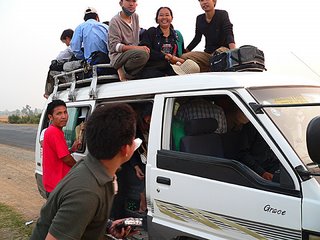
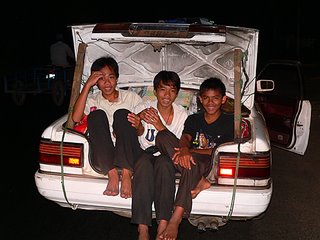
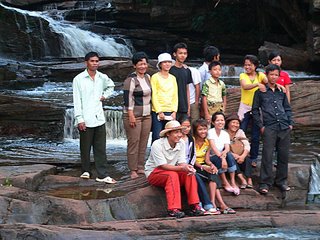 How many Cambodians fit in or on a vehicle?
How many Cambodians fit in or on a vehicle?Always one more.
I was standing outside my guesthouse on National Road 5 taking photos of the interesting transport forms that were passing. An early model Camry pulled up right next to me. Apart from the driver it had four adults on the back seat plus several children squeezed in. The front bench seat had another two adults beside the driver. The boot (trunk to Americans) was overfull and the lid was strapped down. The driver got out and seemed to be looking for someone—going back and forth in the front yard of the guesthouse. Shortly an acquaintance of mine came out. 'I go Phnom Penh' he said to me. He then got into the front seat and the driver squeezed into the space that was left. Then off they went in the direction of Phnom Penh. I realised that this car was a taxi. They carry as many passengers as they can fit and extract a fare from each one. My acquaintance is a captain in the local traffic police.
The family of Sunah and Seinee had invited me to accompany them and some friends to Sihanoukville, a beach resort town on the Cambodian coast. I said that I would like to go but was not sure of my commitments as I was expecting friends to arrive in Cambodia on the weekend. When I checked my email last Saturday I discovered that Normand was not well so he and Ursula were delaying their trip. I was free to make the journey to Sihanoukville. When I told S&S the news, they told me they would have to check with the driver of the van as all the seats were taken. Later I was assured that somehow they would fit me in.
On Tuesday morning I got up at 4 am to be ready on time. I was starting to wonder what fitting me in meant with pictures of that taxi in my mind. My body does not cope well with long distance travel in cramped conditions. I find most seats in a van uncomfortable. When I arrived at the S&S house I was given a seat in the front of the van which had sufficient room for my long barung legs. And fit me in? Heh-heh. It seems that the size of the group had increased dramatically. Do you think the driver would knock anyone back? No, his fee was 5,200 reil per person. So how many people do you think they could fit in a typical people-mover type van?
Vans of this size in Australia usually have perhaps three rows of seats. There were five in this one. Four people sat in each row and I suspect one or two extras squeezed in somehow. And then there was the roof rack. The rest pile on up there with the luggage. The total count (not sure if it included the driver) was 32. There was another similar van with a similar number of travellers and a couple of cars. One car did not have enough room within so the boot lid was propped open with a couple of pieces of wood and three passengers made the journey sitting in there.
As we were getting closer to Sihanoukville we stopped on a mountain pass where many spirit houses were erected. Our group did as most other travellers do and paid respects to the spirits, requesting safe passage. I think both the spirits and the driver were looking after us as we had been travelling quite safely for four and a half hours when we reached the outskirts of Sihanoukville. We were pulled over by the police.
They immediately gave the driver a ticket which required him to pay a fine of 5,000 reil ($A1.70). This was not a bribe as the ticket was an official receipt. The police ordered the rooftop passengers to get down. I'm being told little bits of what is going on but because I understand almost no Khmer I know very little. Members of our party are having discussions with the police. Apparently the problem is that people travelling on the roof will make the city look untidy. Anyone who has ever visited Cambodia, or indeed Sihanoukville, will appreciate the irony of this. Safety is apparently not an issue. Someone in our group tells a cop that we have travelled all the way from Kompong Chhnang to celebrate Women's Day at the beach. And somehow this does the trick. Our rooftop passengers are allowed to climb back up and off we go.
During out time in Sihanoukville we encounter police again on a couple of occasions. Each time the passengers on the roof are required to get off and walk. We drive on a few blocks turn a corner and wait. When they catch up, they get back on the roof and on we go.
We spend most of our time over two days at beaches in Sihanoukville. They are OK but to an Australian nothing special. There is no surf. My Cambodian friends think it is wonderful but they are a little afraid of the water not to mention the sun. There is little if any body exposure. They go into the water fully clothed. I almost said 'swim' but few of them can swim more than a few strokes. I am often asked 'Are you afraid?'
'Of what?' I reply.
They don't really know what there is to be scared of but to them the water is an unnatural environment, one in which they are not fully comfortable.
In the evening we go to a guesthouse and rent a few rooms. Nine people share the room that I am in.
I am regularly being asked if I am happy. On Wednesday evening I explain to a group of my friends: Most barung who visit Cambodia get to meet only those people they need to deal with in their hotel or in shops. Some guys find themselves a Cambodian girlfriend. You see them travelling around together on a motorcycle. But still it is just one Cambodian they are getting to know. On the other hand I have the pleasure of the company of a large group of people, most of whom treat me like a brother. Why wouldn't I be happy?
I came to Cambodia to live like a Cambodian, to experience the lifestyle of Cambodian people to the extent that it is possible for a Westerner to do so. I have now experienced a holiday Cambodian style. Few concessions were made for me. I lived and ate much as they did. Sure there were challenges for me. I was obliged to eat food that I would normally have avoided. But I survived. In fact some of the Cambodians in our group complained of stomach aches. I was fine.
On Thursday morning we piled back into the van at about 5.30 am and started the journey back home. First we stopped at a waterfall which was pretty wonderful—certainly more appealing to me than the beach. However the vendors were there ready to serve at even that early hour. With the number of stalls set up at the site, I realise that this is a very popular place and in a few hours it would be crawling with people. I'm glad we made it as early as we did.
We stop again in a market town to buy food for lunch. It is busy and dusty.
Once more we stop on the mountain pass to pay our respects to the spirits. I need to go and ask if it would offend the spirits if I peed on the side of the road here. Yes, it would. But it seems the spirits are not offended by litter which lines the roadside just about everywhere.
On we go and eventually safely reach Kompong Chhnang in time for me to make a late start for my English class at Wat Xam. I've had a wonderful time. I'm tired. But I don't want to miss my English classes.
Some other news this week.
After I wrote my blog last week, but before I posted it, a group—young men including monks, young women and a grandfather (me)—climbed Phnom Krang Day Meas, a hill/mountain not far from Kompong Chhnang. I have no way of measuring its height so have no way of knowing if it is a hill or a mountain. I can assure you that by time we reached the top in the heat it felt like a mountain. However, if it was a mountain, perhaps it would have been a little cooler at the top. I enjoyed the day. It gave me an opportunity to observe young Cambodian men and women interacting—quite subdued compared to Westerners.
Since I've been here my friends have been telling me that $US5 a day is expensive for my accommodation. Someone suggested that I could rent a house for $US20—50 per month. I didn't take too much notice of that. Many of the houses here are clad with palm leaves. I'm sure it's cool in the heat and looks very traditional. If I didn't have a few thousand worth of technology to consider I might take such a house. But under the circumstances I think that security might be an issue.
Eventually Vana showed me a room that I could get for $35 per month and it is better than the one I had—in most ways. Even has a cistern for flushing the toilet. And it's about 100 metres back from the main road so is usually quieter.
I can't say I was unhappy with Holiday Guesthouse. They always treated me well. In fact, the guesthouse is almost surrounded by houses of family members who were always coming and going. I feel I have become part of that family and continue to go back to their restaurant for meals. If things don't work out well in the new place I would be happy to go back.
That's my week once again. I've taken lots of photos some of which you can see in the usual places. I hope you'll take a look. In another week my visa is due for renewal. This will be the first time I will have been through this process in Cambodia. I trust all will go well. If it does, expect me to be reporting from Kompong Chhnang for at least the next six months.
Saturday, March 04, 2006
Cambodia 2006: week 2
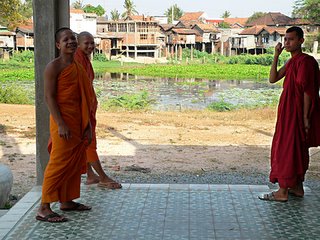 Thursday 2 March
Thursday 2 MarchThis week has been rather busy I have not found time for daily entries so will give some highlights and general thoughts.
Last Saturday I did not accomplish as much as I had hoped. I was told to expect a bus to Phnom Penh between 8 and 8.30 am. I sat at the front of the guesthouse until 10.10 before one arrived. I enjoyed the time saying 'hello' to the many passers-by. However that was two hours less that I had to spend in Phnom Penh as the last bus still left at 3 pm (or thereabouts). I spent most of that time in the internet cafe but I still did not finish all I had wanted to do there. Nor did I have time for shopping or the other tasks I had hoped to complete. I did not have lunch until I returned to Kompong Chhnang at about 5.30. Still the bus trip was enjoyable. I always enjoy travelling through rice fields and villages. And on the return journey had the company of a young monk who could speak a little English.
I am now teaching daily classes at Wat Xam. At 3 pm each day I have a class of young monks—most aged around 20. They have mixed abilities in English. Some grasp what I say immediately while others are struggling to understand much of it at all. This week's picture shows some of my students waiting at the school for class to begin. The waterway in the background will be much deeper in a few months when the rainy season begins. Hopefully I'll still be here to bring you photos.
For many of these young men the decision to become a monk is a financial rather than a religious one. Students at public schools in Cambodia are required to pay the teacher for their daily lesson—no money, no school. This is because teachers are paid quite a low salary. If they don't supplement their income in this way, they cannot afford to continue teaching. Sophal told me that his children go to public school in the morning and 'private' school in the afternoon—same school, same teacher but teachers keep the 'better' lessons for the 'private' students—ie those whose parents can afford to pay a little extra.
I do not know about the wages of teachers in Cambodia however there is an article in the Phnom Penh Post about doctors and nurses in rural health centres. Nurses and doctors are paid a government salary of $US20 and $45 respectively, per month. With the help of NGOs these wages are being subsidised so that they now receive an average of $120 per month. I am not aware that teachers' salaries are being subsidised in this way. To put this in perspective, I live here quite frugally. I probably spend around $US10 per day.
For many boys the only way their families can hope to have them educated is to send them to the monastery to become monks and they are educated for free by teacher monks. I don't think a similar opportunity is available for girls. These young men might be 20 or perhaps more but they tell me they are in grade 10 or whatever. Because of missed schooling over the years, not many complete high school by the age of 18.
I observe that many of them are normal young men who happen to wear monk's robes and live under the restrictions that this places on them. Some talk about the day they will disrobe and be able to get a girlfriend or wife. One apparently contrived to miss his last head shave because he wants to wear his hair longer. They seem to have caught up with him now but earlier in the week his hair was longer than mine. Usually between 15 and 20 of them attend my classes. I'm told there are around 100 monks living at the wat.
At 5 pm each day I have another class of mixed teenagers. Well, I assume they are all teenagers. It is hard to tell by their size. The smallest student in the class is a girl who looks to me to be around eight. She is twelve. The oldest student, whose age I am aware of, is 18. They are a delightful group although a little shy. I am encouraging them to practise role play to build their confidence. For some reason this class is much looser than the monks' class. I go into crazy storyteller mode and we have a lot of fun. I share this class with Sokun who I befriended last year when he was a monk. Although he has disrobed he still lives at the monastery as he cannot afford to live elsewhere. He has more freedom than the monks but the head monk still keeps a watchful eye on him. Sokun is 25 and respectfully, or perhaps a little cheekily, calls me 'grandfather'.
Teaching English here is also to teach social studies. Such is the students lack of knowledge of the Western world. Most of my students have never used a computer and have no concept of the internet. Most have never been inside an airport, let alone flown overseas. They don't have a clue what a supermarket is. One of the English teachers asked me to explain 'rock', 'jazz' and 'rap'.
I have quite a few friends outside the wat now and am in demand socially. Everyone wants to practise English with the 'barung'. On Monday, La and a couple of other guys took me to Phnom Suntooch, where there is a wat and a 'mountain'. The Khmer word 'phnom' means either 'hill' or 'mountain'—there is no differentiation. They keep calling it a mountain but it is not really even a big hill. There are many boulders there and we spent some time climbing them. Hopefully, by time you read this, there will be one or two photos on the flickr pages. There is a bigger hill that is perhaps almost a mountain just a little further out of town and tomorrow, Friday, a group of us are planning to climb it. We travel to these places by bicycle.
One day I was looking perhaps a little lost in the markets when a young woman, maybe about 135 cm tall, took the time to assist me. She did not belong to the stalls I was buying from but was simply being helpful. When I went to pay I produced a $US20 note. She grabbed the note and ran off with it saying 'I get change.' After a few minutes I was wondering if I would see her again. She returned eventually with not just the usual rate of exchange but also the little extra that you only get from the money changer. She had taken the trouble to go down the road to change my money and returned it all to me.
A few days later, walking through the market, I saw a girl who I recognised as my helpful friend. We started talking and she invited me to her stall. She sat me down, introduced me to her parents and brought me water. After the usual basic questions in English she began teaching me to count in Khmer. Her name is Sunah and she prepares meals that are sold to vendors all over the market—potentially several hundred customers. We were quite involved in my lesson when another one arrived. I looked at her. She said 'hello'. I looked back at Sunah and then again to the newcomer. They were almost exactly alike.
'Are you sisters?' I asked.
'We are twins.' the newcomer replied.
The second twin is named Sunee. They are almost identical but I am able to tell them apart. However, last night when I was visiting their home, which is quite close to my guesthouse, Sunee told me that it was she who had helped me in the market a few days before. Until then I had simply assumed it was Sunah.
Late last Sunday afternoon as I was riding past the school I visited on my first night back in KC the director called out to me. I stopped to say hello. 'Leave your bike here,' he said. 'Come on my motorcycle.' I did as he suggested. We went down a side road (dirt track) towards the Tonle Sap. Here the last of last year's flood was still receding. In the water a late crop of rice had been planted. There were also ponds of lotus flowers. As the sun was setting we stood enjoying the sight. Phnom Kong Rai is on the other side of the Tonle Sap. (More about this mountain to come when I learn the whole story.) And the frogs were chirping. For once I didn't have my camera. You'll have to take my word for the beauty and tranquility of this scene.
I have been back in Cambodia now for almost two weeks and as I'm sure you can tell I am extremely happy here. In another two weeks I will have to renew my visa. All being well, I will apply for a six month extension.